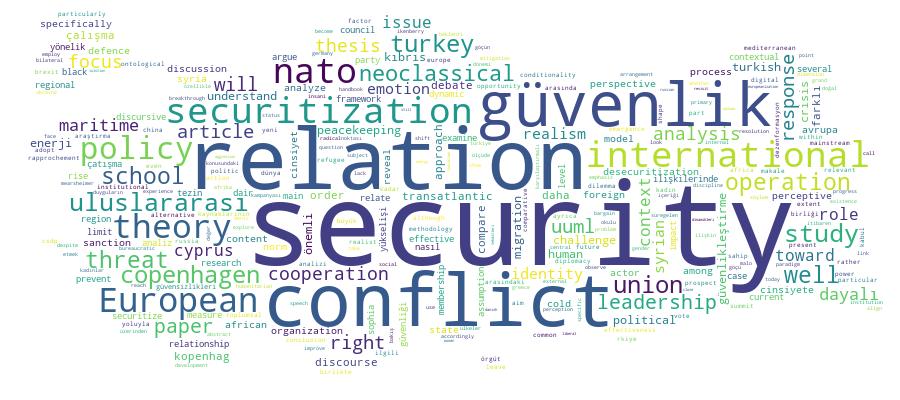Akgül Açıkmeşe, Sinem
Loading...

Profile URL
Name Variants
A.,Sinem
S. Akgül Açıkmeşe
Akgul Acikmese,S.
Sinem Akgül Açıkmeşe
Akgül Açıkmeşe, Sinem
Akgul-Açikmeşe S.
Akgül Açıkmeşe, SINEM
Akgul Acikmese,Sinem
A., Sinem
Akgul Acikmese S.
AKGÜL AÇIKMEŞE, SINEM
Akgül Açikmeşe S.
Sinem AKGÜL AÇIKMEŞE
Akgül-Açıkmeşe S.
Akgül Açıkmeşe,S.
Akgul Acikmese, Sinem
Sinem, Akgul Acikmese
SINEM AKGÜL AÇIKMEŞE
Akgül-Açikmeşe S.
Akgül Açıkmeşe, S.
AKGÜL AÇIKMEŞE, Sinem
Akgül Açikmeşe, S.
Akgül-Açıkmeşe, S.
Acikmese Akgul, Sinem
Açıkmeşe Akgül, Sinem
Acikmese, Sinem Akgul
Akgul-Acikmese, Sinem
Açıkmeşe, Sinem Akgül
Açikmeşe, Sinem Akgül
Akgül-Açıkmeşe, Sinem
S. Akgül Açıkmeşe
Akgul Acikmese,S.
Sinem Akgül Açıkmeşe
Akgül Açıkmeşe, Sinem
Akgul-Açikmeşe S.
Akgül Açıkmeşe, SINEM
Akgul Acikmese,Sinem
A., Sinem
Akgul Acikmese S.
AKGÜL AÇIKMEŞE, SINEM
Akgül Açikmeşe S.
Sinem AKGÜL AÇIKMEŞE
Akgül-Açıkmeşe S.
Akgül Açıkmeşe,S.
Akgul Acikmese, Sinem
Sinem, Akgul Acikmese
SINEM AKGÜL AÇIKMEŞE
Akgül-Açikmeşe S.
Akgül Açıkmeşe, S.
AKGÜL AÇIKMEŞE, Sinem
Akgül Açikmeşe, S.
Akgül-Açıkmeşe, S.
Acikmese Akgul, Sinem
Açıkmeşe Akgül, Sinem
Acikmese, Sinem Akgul
Akgul-Acikmese, Sinem
Açıkmeşe, Sinem Akgül
Açikmeşe, Sinem Akgül
Akgül-Açıkmeşe, Sinem
Job Title
Prof. Dr.
Email Address
Main Affiliation
International Relations
International Relations
03. Faculty of Economics, Administrative and Social Sciences
01. Kadir Has University
International Relations
03. Faculty of Economics, Administrative and Social Sciences
01. Kadir Has University
Status
Current Staff
Website
ORCID ID
Scopus Author ID
Turkish CoHE Profile ID
Google Scholar ID
WoS Researcher ID
Sustainable Development Goals
15
LIFE ON LAND

0
Research Products
16
PEACE, JUSTICE AND STRONG INSTITUTIONS

2
Research Products
14
LIFE BELOW WATER

0
Research Products
6
CLEAN WATER AND SANITATION

0
Research Products
3
GOOD HEALTH AND WELL-BEING

0
Research Products
17
PARTNERSHIPS FOR THE GOALS

0
Research Products
4
QUALITY EDUCATION

0
Research Products
2
ZERO HUNGER

0
Research Products
10
REDUCED INEQUALITIES

3
Research Products
7
AFFORDABLE AND CLEAN ENERGY

0
Research Products
13
CLIMATE ACTION

0
Research Products
1
NO POVERTY

0
Research Products
9
INDUSTRY, INNOVATION AND INFRASTRUCTURE

0
Research Products
12
RESPONSIBLE CONSUMPTION AND PRODUCTION

0
Research Products
8
DECENT WORK AND ECONOMIC GROWTH

0
Research Products
11
SUSTAINABLE CITIES AND COMMUNITIES

0
Research Products
5
GENDER EQUALITY

1
Research Products

Documents
15
Citations
50
h-index
4

Documents
20
Citations
59

Scholarly Output
34
Articles
17
Views / Downloads
334/3704
Supervised MSc Theses
7
Supervised PhD Theses
4
WoS Citation Count
44
Scopus Citation Count
66
WoS h-index
4
Scopus h-index
5
Patents
0
Projects
0
WoS Citations per Publication
1.29
Scopus Citations per Publication
1.94
Open Access Source
19
Supervised Theses
11
Google Analytics Visitor Traffic
| Journal | Count |
|---|---|
| Routledge Handbook of Conflict Response and Leadership in Africa | 4 |
| Uluslararasi Iliskiler | 3 |
| Southeast European and Black Sea Studies | 3 |
| Journal of Balkan and Near Eastern Studies | 2 |
| Journal of European Integration | 1 |
Current Page: 1 / 2
Competency Cloud


